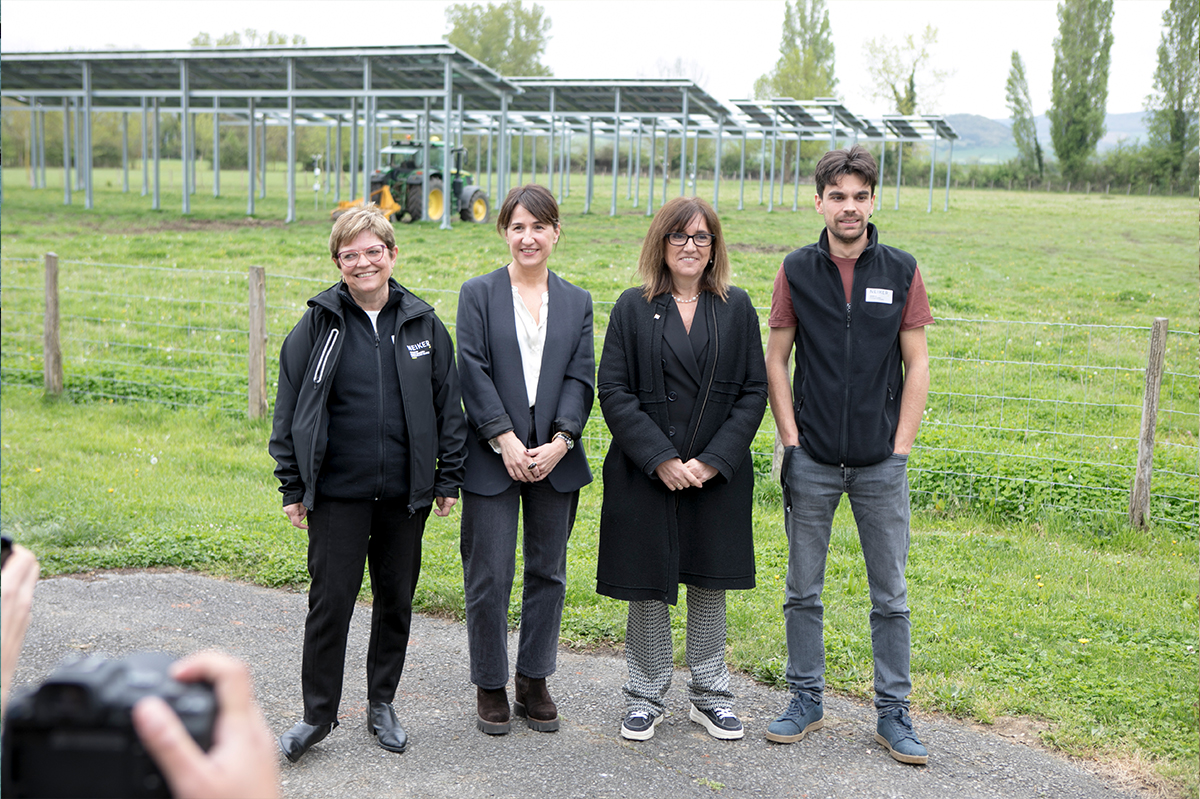NEW
We inaugurated in Arkaute the largest experimental agrovoltaic unit in the State for herbaceous crops to investigate its viability
29 April 2025- Composed of 212 photovoltaic modules spread over 8,000 m², they are estimated to generate 163,914 kWh annually, equivalent to the average electricity consumption of approximately 50 homes.
- Agrivoltaics consists of the shared use of the same land area for agricultural activities and the generation of electricity using solar energy.
- The new infrastructure will be used for the development of the European AgriPower project, led by NEIKER, which aims to test intelligent agrivoltaic systems.
At NEIKER, we presented today this innovative experimental agrivoltaic installation that will allow us to test the compatibility of agricultural operations on rural land and renewable energy production.
The facility covers an area of 8,000 m², making it the largest experimental unit in Spain for herbaceous crops. The Basque Government’s Minister of Food, Rural Development, Agriculture, and Fisheries, Amaia Barredo, and the General Director of NEIKER, Olatz Unamunzaga, participated in the inauguration ceremony.
The agrovoltaic installation will allow us to study the coexistence of solar energy production and agricultural production under real-world conditions without compromising the productive potential of rural land. In total, we have installed 212 photovoltaic modules, which are estimated to generate 163,914 kWh annually, equivalent to the average electricity consumption of approximately 50 homes.
The energy generated will be used entirely for self-consumption on the Arkaute campus, allowing us to significantly reduce electricity demand from the grid. In this way, the installation will not only contribute to moving toward a more sustainable energy model but will also improve the efficiency and self-sufficiency of our own campus.
Agrovoltaic
The agrovoltaic installation involves the shared use of the same land area for agricultural activities and the generation of electricity using solar energy. This innovative solution aims to address key challenges facing the sector, such as adapting agriculture to climate change, diversifying rural incomes, and ensuring efficient land use.
Half of the area (4,000 m2) will be used as an agrivoltaic structure (agricultural production and solar panel installation), while the other half will remain as a control zone for exclusive agricultural use. This design will allow us to accurately analyze and compare the differences in agricultural production performance in both areas.
“The facility strategically positions us to generate rigorous and proven technical knowledge that will help the agricultural sector access real solutions tailored to its conditions. The goal is to explore whether energy generation can be compatible with food production; if viable, it could be a very good solution for our sector,” said Olatz Unamunzaga, CEO of NEIKER.
European Project
The new infrastructure will also serve as a platform for the development of the European AgriPower project, led by NEIKER, which aims to test smart agrivoltaic systems that maintain agricultural productivity while optimizing energy efficiency. To this end, we will test various arable herbaceous crops, such as lettuce and potatoes, under agrivoltaic structures, with the aim of evaluating their adaptation and sustainability in combination with solar energy generation.
In this regard, Amaia Ortiz, head of NEIKER’s Plant Production and Protection Department and project coordinator, emphasized the importance of generating solid scientific data that allows for the appropriate selection of both crops and installation designs, ensuring their sustainability from an agricultural, energy, and economic perspective. “The sector needs real evidence, obtained under field conditions, to make well-founded decisions. Furthermore, this data will be key to designing effective governance models that facilitate the responsible implementation of agrivoltaics,” Ortiz noted.
The project, which is being developed in collaboration with entities from the Basque Country, Navarre, and southern France, includes field trials under real conditions, a methodological review, the development of support tools for producers, and the preparation of a report with public policy recommendations to promote the safe and effective implementation of agrivoltaics in the Basque Country.
“Agrivoltaics represents an opportunity to simultaneously address several challenges: the energy transition, adaptation to climate change, the economic sustainability of farms, and the compatibility between food production and energy generation,” the researcher concluded.



